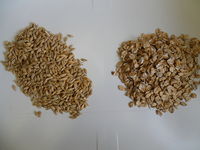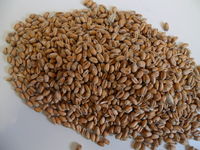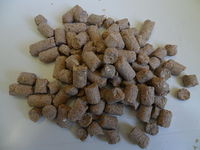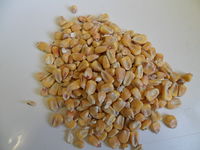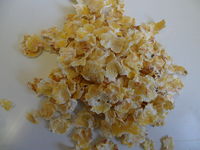Difference between revisions of "Cereals and By-Products"
| (8 intermediate revisions by 2 users not shown) | |||
| Line 1: | Line 1: | ||
==Barley, Wheat & Oats== <!----Write below this line---> | ==Barley, Wheat & Oats== <!----Write below this line---> | ||
| − | [[File: | + | [[File:Whole and rolled barley.jpg|Barley|200px]] |
[[File:Porridge oats.JPG|Oats|200px]] | [[File:Porridge oats.JPG|Oats|200px]] | ||
| − | [[File:Wheat.jpg|Wheat|200px]] | + | [[File:Wheat1.jpg|Wheat|200px]] |
| + | [[File:Wheatfeed.jpg|Wheat Feed|200px]] | ||
====Characteristics====<!----Write below this line---> | ====Characteristics====<!----Write below this line---> | ||
Barley, wheat and oats are all starch rich cereal grains. They can be fed whole or processed. During processing, these grains can be rolled, bruised, milled, crimped, micronised, or treated with alkali or acid (e.g.prop-corn). In general, cattle need the grains to be processed more than sheep and goats. | Barley, wheat and oats are all starch rich cereal grains. They can be fed whole or processed. During processing, these grains can be rolled, bruised, milled, crimped, micronised, or treated with alkali or acid (e.g.prop-corn). In general, cattle need the grains to be processed more than sheep and goats. | ||
| Line 25: | Line 26: | ||
[[File:Wheat distillers grains.jpg|wheat distiller's grains|200px]] | [[File:Wheat distillers grains.jpg|wheat distiller's grains|200px]] | ||
[[File:Distillers dark grains.jpg |distiller's dark grains|200px]] | [[File:Distillers dark grains.jpg |distiller's dark grains|200px]] | ||
| + | [[File:Malt culms.jpg|Malt Culms|200px]] | ||
<br> | <br> | ||
===Characteristics=== | ===Characteristics=== | ||
| Line 44: | Line 46: | ||
==Maize and Maize Gluten Feed== <!----Write below this line---> | ==Maize and Maize Gluten Feed== <!----Write below this line---> | ||
| − | [[File:Maize Corn.jpg|Maize | + | [[File:Maize.jpg|Maize Corn|200px]] |
| + | [[File:Flaked maize.jpg|Flaked Maize|200px]] | ||
===Characteristics===<!----Write below this line---> | ===Characteristics===<!----Write below this line---> | ||
These feeds are typically processed and may be flaked, rolled or micronised. They are suitable for ruminants and non-ruminants. Maize and maize gluten feed have high digestible energy, but poor source of calcium. | These feeds are typically processed and may be flaked, rolled or micronised. They are suitable for ruminants and non-ruminants. Maize and maize gluten feed have high digestible energy, but poor source of calcium. | ||
| Line 64: | Line 67: | ||
{{Learning | {{Learning | ||
| − | |flashcards = [[Animal Nutrition Flashcards]] | + | |flashcards = [[Large Animal Nutrition Flashcards]] |
}} | }} | ||
| − | [[Category:Animal Nutrition]] | + | [[Category:Large Animal Nutrition]] |
[[Category:To Do]] | [[Category:To Do]] | ||
Latest revision as of 09:20, 27 October 2015
Barley, Wheat & Oats
Characteristics
Barley, wheat and oats are all starch rich cereal grains. They can be fed whole or processed. During processing, these grains can be rolled, bruised, milled, crimped, micronised, or treated with alkali or acid (e.g.prop-corn). In general, cattle need the grains to be processed more than sheep and goats.
| DM (%) | ME (MJ/kg DM) | CP (g/kg DM) | |
|---|---|---|---|
| Barley | 86 | 12.8 | 110 |
| Wheat | 86 | 13.5 | 120 |
| Oats | 86 | 12 | 110 |
Associated Problems
Bloat. Acidosis. Soft fat. Liver abscesses. Cereals typically very poor source of calcium and deficient in Vitamins A and D.
Distillery and Brewing By-Products
(Brewer’s grains, Distiller’s grains (draff), Distiller’s dark grains, Malt culms)
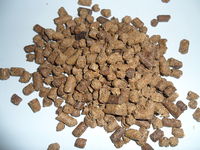
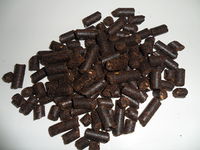
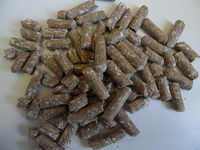
Characteristics
These by-products can be variable and are more suited to ruminants. They are a good source of fibre and have high unsaturated fatty acid content. The low DM by-products can be fed fresh or they can be ensiled. They are high in phosphorus but low in calcium and other minerals.
| DM (%) | ME (MJ/kg DM) | CP (g/kg DM) | |
|---|---|---|---|
| Brewers grains | 26 | 11.2 | 250 |
| Distillers grains | 25 | 14.7 | 270 |
| Distillers dark grains | 89 | 12.2 – 14.8 | 275 - 350 |
| Malt culms | 90 | 11.2 | 270 |
Associated Problems
Can be associated with deficiency in calcium, magnesium and other minerals. Poor fermentation and its associated problems can be encountered when ensiled.
Maize and Maize Gluten Feed
Characteristics
These feeds are typically processed and may be flaked, rolled or micronised. They are suitable for ruminants and non-ruminants. Maize and maize gluten feed have high digestible energy, but poor source of calcium.
| DM (%) | ME (MJ/kg DM) | CP (g/kg DM) | |
|---|---|---|---|
| Maize | 86 | 14.2 | 98 |
| Flaked Maize | 90 | 15 | 110 |
| Maize gluten feed | 90 | 12.7 | 250 |
Associated Problems
Maize and maize gluten feed can cause bloat and acidosis. The carcase fat colour can have a yellow pigmentation (due to presence of cryptoxanthin).
| Cereals and By-Products Learning Resources | |
|---|---|
 Test your knowledge using flashcard type questions |
Large Animal Nutrition Flashcards |
